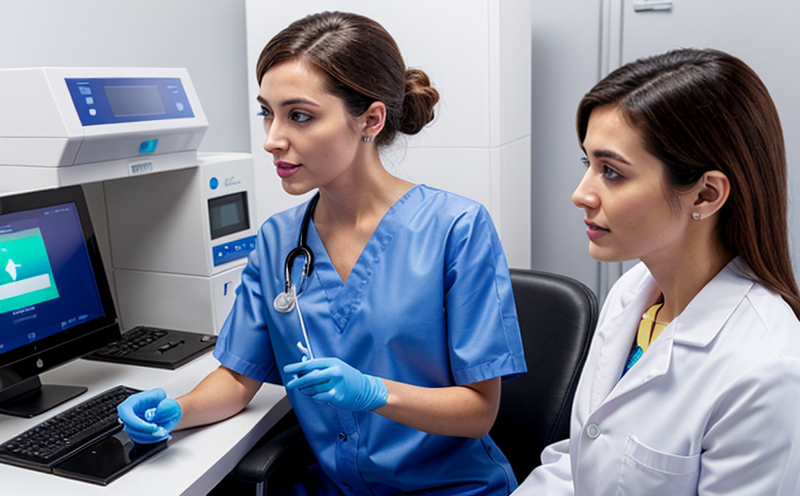Molecular Detection of Pathogenic Vibrio Species in Seafood
The molecular detection of pathogenic Vibrio species in seafood is a critical process aimed at ensuring food safety and quality. Vibrio species, including V. cholerae, V. parahaemolyticus, and V. vulnificus, are known to cause various illnesses in humans when consumed via contaminated seafood products. This service provides comprehensive testing solutions using advanced molecular techniques such as polymerase chain reaction (PCR) and nucleic acid sequencing.
The process begins with the collection of samples from various sources including raw materials, finished goods, and processing environments. Samples are then prepared by extracting DNA or RNA to ensure that they are suitable for molecular testing. Real-time PCR is used to amplify specific regions of the genome associated with pathogenic strains of Vibrio species. This technique allows for the identification and quantification of these pathogens at extremely low levels.
The use of advanced sequencing technologies enables not only detection but also detailed characterization of the genetic makeup of isolated organisms, which can be invaluable in understanding the source of contamination or tracking emerging strains. The laboratory adheres to strict protocols ensuring accuracy and reproducibility, thereby maintaining high standards for all tests conducted.
For effective implementation, it is important that laboratories have proper infrastructure like temperature-controlled storage facilities for samples, state-of-the-art PCR machines, and bioinformatics software capable of handling large datasets generated during sequencing processes. Additionally, personnel involved must undergo continuous training to stay updated on latest developments in molecular diagnostics.
The benefits extend beyond just detection; this service aids in developing robust food safety programs by providing actionable insights into potential hazards within supply chains. It helps companies meet regulatory requirements set forth by organizations such as the FDA (Food and Drug Administration) or EU regulations, ensuring compliance while enhancing consumer confidence through safer products.
By leveraging cutting-edge technology and adhering strictly to scientific principles, our laboratory ensures reliable results that contribute significantly towards maintaining public health. Our expertise in this area has made us a trusted partner for many leading organizations across different sectors including pharmaceuticals, agriculture, and food processing industries.
Industry Applications
| Application Area | Description |
|---|---|
| Seafood Processing Plants | Screening raw materials and finished products for presence of pathogenic Vibrio species. |
| Pharmaceutical Manufacturing Facilities | Monitoring environmental samples to prevent cross-contamination during production processes. |
| Agricultural Enterprises | Detecting sources of contamination in irrigation water or soil used for growing aquatic plants consumed by seafood species. |
| Research Institutions | Studying the spread and evolution of different strains of Vibrio through longitudinal studies on contaminated environments. |
Quality and Reliability Assurance
To ensure consistent accuracy and reliability in our molecular detection services, we follow stringent quality assurance measures. Each step from sample collection to final analysis undergoes rigorous validation procedures ensuring compliance with international standards like ISO/IEC 17025 for laboratory accreditation.
Our highly skilled team members participate actively in proficiency testing programs organized by recognized bodies such as the American Type Culture Collection (ATCC) or European Co-operation for Accreditation (EA). These exercises help maintain our laboratories' credibility and competence. Furthermore, regular internal audits conducted by independent experts further reinforce these efforts.
Technology plays a pivotal role here too; we invest heavily in acquiring top-notch equipment that meets highest industry benchmarks. Regular maintenance schedules coupled with continuous calibration ensure optimal performance of all instruments used during testing. Additionally, ongoing staff training sessions keep everyone abreast of any advancements made in molecular biology techniques.
The commitment to quality extends beyond laboratory operations into customer service as well. We strive for transparent communication throughout the entire process, providing clear timelines and expected outcomes upfront. This approach fosters trust between us and our clients, enabling them to plan their activities accordingly knowing they can rely on precise results delivered promptly.
Customer Impact and Satisfaction
The primary goal of any food safety program is to protect consumers from illnesses caused by harmful microorganisms present in food products. By offering reliable molecular detection services for pathogenic Vibrio species, our customers gain peace of mind knowing that their supplies are safe.
Companies benefit significantly when they can demonstrate adherence to stringent regulatory requirements. This not only enhances brand reputation but also opens up new markets where stringent safety standards are enforced. For research institutions, having accurate data on contamination levels helps refine control strategies effectively.
Moreover, early detection leads to quicker responses which minimize economic losses due to recalls or product withdrawals. In terms of customer satisfaction, prompt delivery of results coupled with comprehensive reports detailing findings contributes positively towards overall client experience.
A satisfied clientele translates into long-term partnerships built on mutual trust and respect. Continuous feedback loops allow us to make necessary improvements continuously improving our services over time. Ultimately, this focus on quality assurance helps build a stronger foundation for sustainable growth within the industry.





